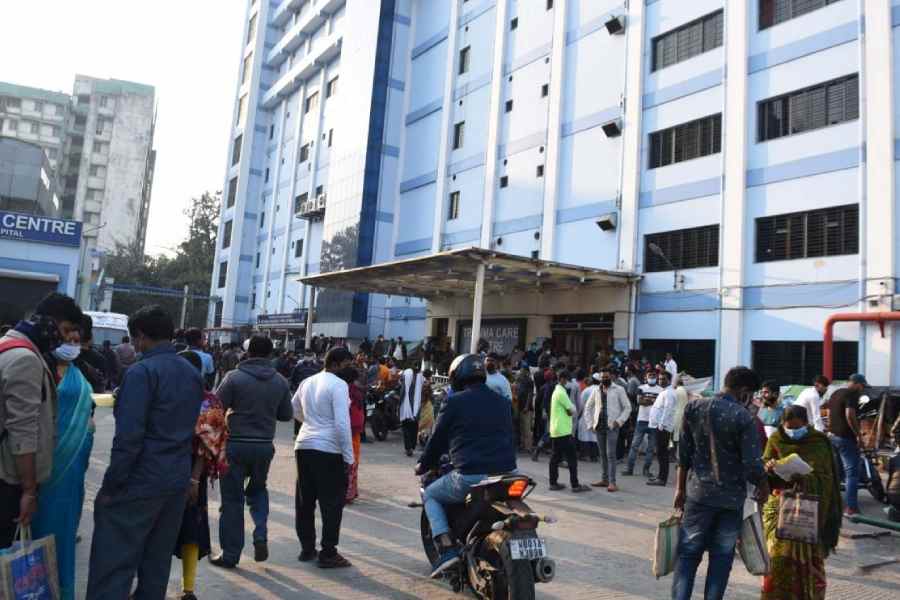An absence of fresh funds from the Union health ministry has stalled the treatment of more than 30 children with rare diseases at one of Calcutta's foremost government hospitals, members of patients’ coalition groups and doctors have said.
The Institute of Post-Graduate Medical Education and Research (IPGMER)-SSKM hospital has stopped treatment of 20 children and deferred initiating treatment for 13 other kids since it exhausted funds earmarked for rare diseases over eight weeks ago, the members and doctors have said.
Two doctors familiar with the plight of the children registered with SSKM said several children currently face disrupted or stalled treatment. “We’re hoping to restart treatment as soon as we receive funds,” a doctor at the IPGMER who requested not to be named told The Telegraph.
A representative of the coalitions called the Organisation for Rare Diseases India (ORDI) and the Rare Diseases India Foundation (RDIF) said two children — a two-year-old girl and a one-year-old boy — died in March this year while waiting for treatment to begin at SSKM.
The children awaiting treatment have rare congenital disorders called Fabry disease, Gaucher disease, or mucopolysaccharidosis that result from malfunctioning enzymes. "When left untreated, there is an accumulation of unwanted byproducts in the body that can lead to organ damage and life-threatening complications," said a paediatrician in Calcutta who has diagnosed children with rare diseases.
The diseases occur in about one in 20,000 to one in 500,000 live births. Many such conditions are treatable with enzyme replacement therapy that costs Rs 10 lakh to Rs 50 lakh per year, depending on the child's weight.
Given medication costs, most parents are involved in a poignant struggle, pleading with the Centre and state governments for financial support and timely release of funds, while government health officials search for pathways to establish a model for sustained funding.
The National Rare Disease Policy document produced by the health ministry in 2021 had said amid resource constraints and competing health priorities, “it will be difficult for the government to fully finance the treatment of high-cost rare diseases”.
The policy document had proposed alternative mechanisms such as voluntary crowd-funding and corporate donor programmes to support treatment to fill the gaps between what the government provides and how much is needed to support patients.
The ministry had in 2022 also pledged Rs 50 lakh for each patient registered with any of the 11 designated hospitals, including IPGMER-SSKM, and said it would work towards a programme for “sustained funding”, the IPGMER doctor said.
But there is no clarity on how sustained funding might be achieved and how to continue with treatment once a patient completes the allotted Rs 50-lakh cap, ORDI-RDIF members have said.
In the absence of standard protocols for implementing the policy, they say, treatment decisions sometimes appear arbitrary. Some designated hospitals, for instance, are hesitating to start treatment on some patients, citing the uncertainty when they reach the 50-lakh limit, said Prasanna Shirol, ORDI’s founder and executive director. And some patients are unable to receive treatment because the government hasn’t fixed the rates to be paid for treatment, he said.
The SSKM authorities stopped treatment of four children after each reached their Rs 50-lakh cap between April and October last year.
“Our daughter hasn’t received any infusion since September 12, 2023,” said Jayanta Mudi, the father of a nine-year-old girl in Calcutta. She had received the medications twice a month since February 2022 but treatment stopped when her treatment expenses touched Rs 50 lakh.
Another patients’ coalition group called the Lysosomal Storage Disorder Support Society (LSDSS) has petitioned Delhi High Court, seeking judicial intervention to nudge the government and hospitals to provide treatment to all eligible children, a member of the LSDSS said.
Expenditure figures shared by the health ministry with the Lok Sabha in February 2024 show that some designated hospitals had not spent money earmarked for rare disease treatment in 2023-24. PGIMER, Chandigarh, for instance, had used up only 54 per cent of Rs 3.92 crore, the Nizam Institute of Medical Sciences, Hyderabad, used up only 1.5 per cent of Rs 4.2 crore, while the Maulana Azad Medical College, New Delhi, did not spend any of the Rs 1.4 crore it had received for 2023-24.
“This is the sad reality,” said LSDSS founder Manjit Singh. “The health ministry needs to ensure that all eligible children are put on treatment and they (designated hospitals) use the funds rather than leaving them unutilised.”
Queries sent by this newspaper to the health ministry seeking its perspective on the concerns about stalled or delayed treatment expressed by the patients’ groups have not evoked a response.
The ministry had earlier asserted that the rare disease policy contains provisions for the promotion of local development and manufacture of drugs “and the creation of a conducive environment for the local manufacture of drugs for rare diseases at affordable prices”.
The ministry had also cited a department of pharmaceuticals scheme providing financial incentives to manufacturers for the domestic production of various drugs, including drugs for rare diseases and customs duty waivers to lower the cost of imported medicines.











